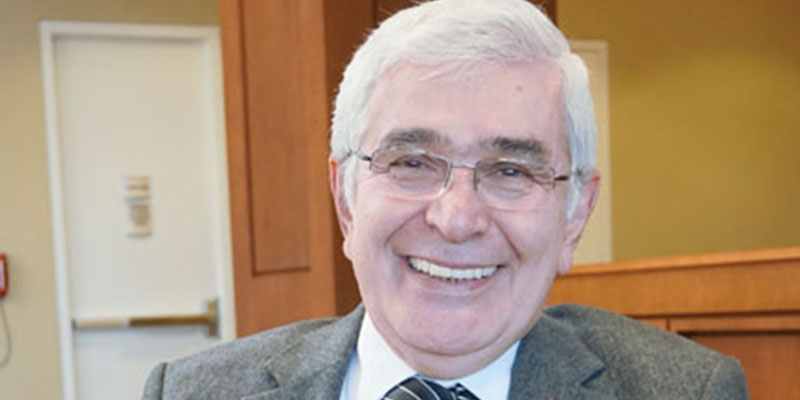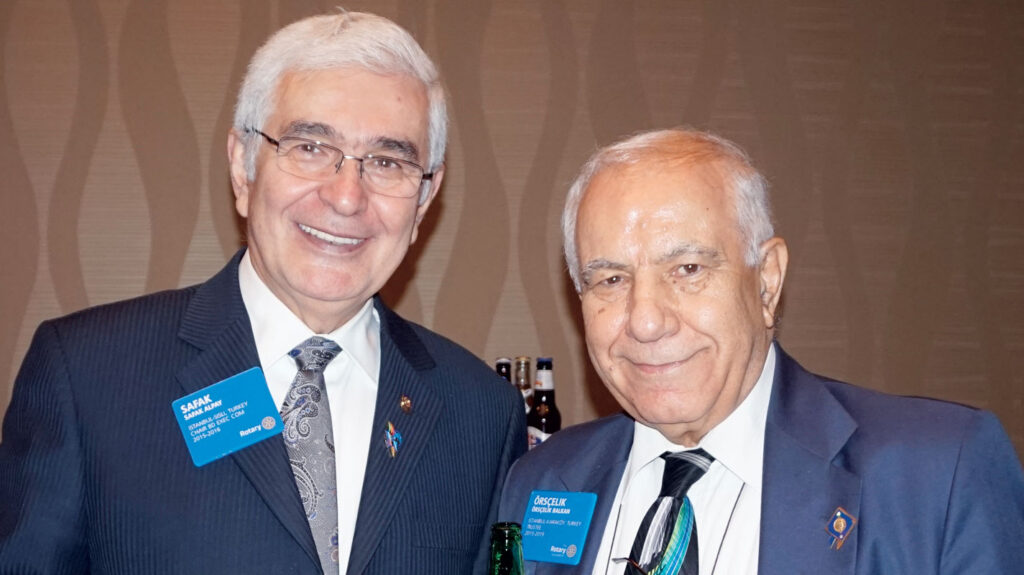He may only have some 60,000-odd Rotarians under his umbrella as an RI Director, but Safak Alpay’s writ runs over a whopping 80 countries in part of Zone 19 and 20. “If you consider that Rotary International has some 200 countries under it, then geographically at least, though not by numbers, a little less than half the countries are in my Zone area, which has 29 Districts,” he smiles as I catch up with him for an interview on the 18th floor of the One Rotary Centre, the RI Headquarters in Evanston, USA.

“But that is not the most interesting part of my Zone area; it is the multicultural and multi-language countries I deal with that makes it remarkable. I have under me Central Asia, Middle East upto the UAE in the east, Africa upto Morocco in the west and what was earlier Eastern Europe — the Czech Republic, Slovenia, Hungary, etc.
So do all these different cultures come into Rotary as one melting pot? “Not really. Even though in Rotary our goals are the same … our worries are sometimes different and we certainly have different needs in the northern part of my zone, which is so very different from the Middle East; Africa, again, is entirely different.”
Joined Rotary at 27
Alpay joined Rotary in 1974 as a young manager of his company which was dealing in electronic instruments. Later he switched his profession to ICT (Information and Communications Technology). Actually, the 27-year-old joined Rotary “by chance.” At that time in Ankara, Turkey, where he lives, there were only two Rotary clubs. “Rotarians in Ankara were very high profile people, influential and at senior managerial positions.” After 10 years of existence of the second club, it was decided to start a new club and, more important, take in young members.
Thus Alpay became one of the 7 chartered members of his club. But even though he had joined Rotary on an invitation and “without knowing too much about it, or just for a pin, eventually I realised that Rotarians are doing extremely good service to society.” At that point, several villages around Ankara were in dire need of special services in areas such as health care, teaching or training material for schools, and so on. So he got involved in carrying out such projects for the villagers and in the process “learnt how our community is actually living. I was only 27 when I joined Rotary and had no idea of the real needs of our community. Rotary gave me an opportunity to understand my people and my country. And I really started enjoying my engagement with Rotary and through it, to my community.”
On how difficult a journey it has been to an RI Director’s level, Alpay says, “If you do the service or different activities in the way they are meant to be done, it just happens. As a young Rotarian, I was very happy, enjoying of course the service project activities as well as fellowship, but slowly club management and project management responsibilities came. And if you deal with all these roles properly, naturally people ask you to join various committees.”
He went on to become the youngest club President in Turkey at 37, and “at 44, I became the youngest District Governor, and I am still keeping that record,” he smiles.
He is proud of the fact that some very good projects were done during his year as Governor and the membership went up too. Next, he served on some international committees, “particularly those involving Rotaractors, Interactors, etc.” Being relatively younger at the Rotary International level, he engaged better with the youngsters and enjoyed interacting and working with them.
But, stresses Alpay, Rotarians should always bear in mind that “you should have a family and business backing you to support your work in Rotary. I learnt from my leaders that we have to take care of our family first, then business and then Rotary, in that order. If we change the order, then it becomes very difficult.”
He is grateful for the fantastic support he got from his family — wife and two daughters.

So how important is spouse support? “Very important; my wife has always supported me and been very closely involved with Rotary activities.”
That brings us to a fascinating nugget this RI Director shares with us. He says that while in some cultures in his zone, the involvement of spouses is very limited, “families in Turkey and countries of the Middle East and Africa are immensely involved with Rotary and almost act like members of the Rotary club! In my family, not only my wife, but also both my daughters are very involved in Rotary.” While his elder daughter is a Charter president of both a Rotary and Rotaract club, his younger daughter is at present the president of a Rotaract club!
Challenges before Rotary today
On the challenges Rotary faces in getting younger members and women, he surprises me by saying that today’s younger managers, businessmen or professionals are “caring much more about society and the community than we did in our generation. They recognise their social responsibilities, and want to get involved in community affairs. But they have worries, they have a family to look after and a job or a business, which is very competitive.”
But what helps, adds Alpay, is that “to be competitive in your profession or job, you have to be social, which means they have to attend either a sports club or participate in some social activity.” Today most companies have CSR activities, which have to be carried out by the executives, who in turn have to depend on their families. “So this way, family and business networking is essential and among these Rotary can find a fit, though by some evolution,” he explains.
The good news is that youngsters are being drawn into Rotary in his Zone area. “In Africa young people are establishing clubs … I call them young professionals. And they are doing so with the support of experienced Rotarians; they organise many club activities according to the needs of the community.”
Another positive for Alpay is that the second Rotary objective, of attracting more women into Rotary, is working wonderfully in some, though not all, areas of his region. “In Africa, women in Rotary are close to 25 per cent; in Africa women have always been very active. It is incredible how active women are in both business and social life in Africa. The same is true of Turkey, and in Arabian countries.”
Mixed clubs more successful
Another interesting disclosure from him is that “mixed clubs are much more successful, at this moment, than single-gender clubs.” And this is because, explains Alpay, “they give another spirit to the entire club. Men have their own way of understanding and handling business or activities. Women, on the other hand, are different. If they want to do something they will do it. And the men join. They are giving motivation to club members and participating in decision making and they and their families enjoy all this tremendously.”
So he has solved both the challenges of Rotary — to get younger people and women — I tell him.
This is only partly true, he says, “because in the northern part, we have difficulty in getting women … in both East and Central Europe.”
But isn’t that a paradox, as women in these countries are more educated and emancipated? “Yes, that is true, but the result is contrary. In Czech, Hungary, etc, we have on an average only 12 per cent women members. They are more conservative when it comes to understanding Rotary. They understand Rotary as a ‘man’s club;’ they say if it’s a new club they might be willing to look at it, but they have a great difficulty in joining clubs which have a predominance of men.”
Integrated projects
Coming to projects, Alpay’s preference is for integrated projects; even if it’s a water project, “we also pack in other elements such as health, literacy, microfinance, etc, depending on that community’s need. I find integrated projects are much more effective and respected.”
On his one big wish for Rotary, Alpay says he and other RI leaders would like to have “Rotary understood, especially by all parts of society. Because as soon as we are able to explain what we are doing, not so much who we are, we have success. Especially among the young generation. If we can give them adequate opportunities to take part in club activities, positions as president, secretary, etc, more young people will join Rotary and help us make a greater impact in society.”
Pictures by: Rasheeda Bhagat





